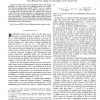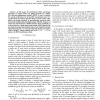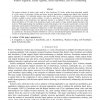102
click to vote
TWC
2010
14 years 8 months ago
2010
In this letter the performance limits and design principles of rateless codes over fading channels are studied. The diversity-multiplexing tradeoff (DMT) is used to analyze the sys...
148
click to vote
ICMCS
2009
IEEE
14 years 11 months ago
2009
IEEE
The goal of this paper is the development of network coding solutions able to improve the performance of video streaming applications over peer-to-peer overlays. Recent advances i...
120
click to vote
VTC
2010
IEEE
15 years 11 days ago
2010
IEEE
— Systematic Luby Transform (SLT) codes constitute rateless codes, which are capable of adaptively adjusting their code rate depending on the channel quality without any explicit...
104
click to vote
CORR
2007
Springer
15 years 2 months ago
2007
Springer
— A rateless code—i.e., a rate-compatible family of codes—has the property that codewords of the higher rate codes are prefixes of those of the lower rate ones. A perfect fa...
103
click to vote
CORR
2008
Springer
15 years 2 months ago
2008
Springer
In this paper the performance limits and design principles of rateless codes over fading channels are studied. The diversity-multiplexing tradeoff (DMT) is used to analyze the syst...
145
click to vote
MM
2005
ACM
15 years 7 months ago
2005
ACM
The inherent instability and unreliability of peer-to-peer networks introduce several fundamental engineering challenges to multimedia streaming over peer-to-peer networks. First,...
146
click to vote
GLOBECOM
2008
IEEE
15 years 8 months ago
2008
IEEE
—Cooperative communication using rateless codes, in which the source transmits an infinite number of parity bits to the destination until the receipt of an acknowledgment, has r...
118
click to vote
INFOCOM
2009
IEEE
15 years 8 months ago
2009
IEEE
The erasure resilience of rateless codes, such as Luby-Transform (LT) codes, makes them particularly suitable to a wide variety of loss-prone wireless and sensor network applicati...



